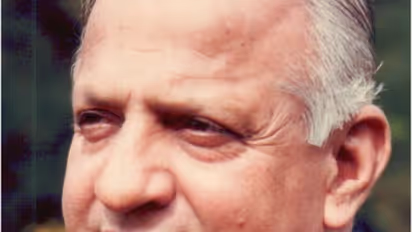Remembering the common man’s leader - Devaraj Urs

Synopsis
Devaraj Urs was Karnataka's former chief minister was popular for his land reforms It was his 101th birth anniversary on August 20 He was in power when Mysore state was renamed as Karnataka
Born on August 20 in 1915 at Mysuru in the aristocratic Arasu community, Devaraj was distant kin to the Wodeyar royal family. However, he chose to struggle for social justice, rather than enjoying life as a landlord.
Urs eventually became chief minister of Karnataka for two terms. One of his first reforms after becoming CM was implementing a sweeping land reform policy, under the slogan ‘Land to the tiller’. This despite the fact that he came from a large land-owning family.
The land reform policy made sure that the person farming the land became the owner of that piece of land.
Till then, massive tracts of land, sometimes in their hundreds of acres, were owned by one family or person. Farmers who toiled in those lands had to give most of the yield to the owner and did not have any right towards it.
The new reform made the person tilling the land its owner, ensuring that those who worked the land could lay claim on it.
He began his political career in 1941. The 26-year-old Urs contested for the Mysuru People’s Representative Meeting as a Congress candidate. He won the election and became the youngest member of the meeting.
Interestingly, in the 1945 election, he could not file his nomination as he could not arrange the deposit of ₹150. Disappointed, he returned to his village to become a farmer. But on the last date of filing the nomination, the Congress candidate went missing, and the party asked Urs to contest in his place.
In reality, the earlier candidate disappeared as he did not want to contest against the Mysuru Royal family. But Urs chose his political path above his family ties.
He then contested in the 1952 state elections, which was the first election in independent India.
Urs contested from Hunsur Constituency and won in the election. After that victory, he never turned his back to politics again.
He was elected continuously from Hunsur as an MLA for 28 years (1952 to 1980).
Urs rose to the limelight in Karnataka politics when he vehemently and single-handedly opposed the candidacy of S Nijalingappa for Chief Minister, as he had lost elections in 1962.
In the meeting, he said “Making a loser as the CM is a sacrilege to democracy. This decision of the legislators’ meeting to make Nijalingappa as the CM will not bring him any gains, but if he accepts the position, he’ll certainly lose his moral strength and integrity.”
This incident changed Urs’s image, and people started seeing him as a strong statesman.
However, strangely, this incident also brought him closer to Nijalingappa. Six months later, Nijalingappa won a by-election and made Urs a Cabinet minister.
From 1969 to 1971, the Karnataka Congress was dominated by Nijalingappa, Veerendra Patil, Ramakrishna Hegde and Deve Gowda. Urs declined an invitation to join their faction, which was anti-Indira Gandhi.
Instead, he led the Indira faction of the state Congress and won the elections in 1971, becoming the chief minister for the first time. He continued to be the chief minister even after the emergency, till 1980.
As Chief Minister, Devaraj Urs focused on the education of the backwards classes, creating state hostels for students hailing from those sections of the society. He included 16,000 unemployed graduates in a stipendiary scheme.
Among his biggest achievements was the legal abolition of the practices of Dalits carrying human faeces and bonded labour in the state.
He also has the credit of renaming Mysore as Karnataka state in 1973.
Devaraj Urs also supported and approved the project proposed by RK Baliga in 1976, laying the foundation for Electronics City in Bengaluru.